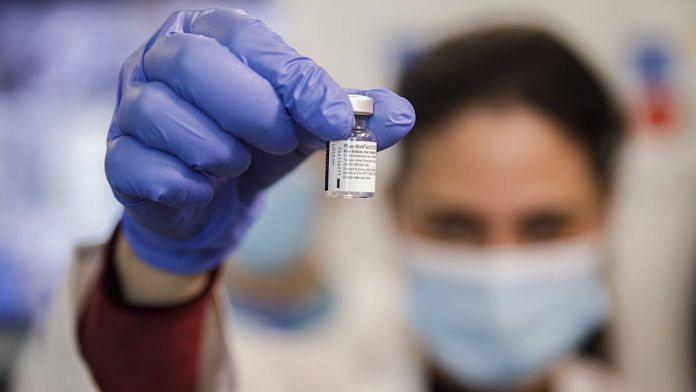The year 2020 was when we saw science power through at its fastest speed ever. From instant sequencing of the novel coronavirus’ genome, to rapidly developing tests and now vaccines for it, we saw researchers, epidemiologists, biologists, and virologists become our heroes in the fight against Covid-19.
If coronavirus was the biggest newsmaker, then science, and specifically mRNA technology, was its nemesis. That’s why mRNA is ThePrint’s newsmaker of the year.
The first approved Covid-19 vaccines in the world with demonstrable efficacy, developed by Pfizer-BioNTech and Moderna, are based on mRNA technology. mRNA or messenger RNA (ribonucleic acid) is simply a means for sending instructions to our body to produce proteins, and is being used in vaccines for the first time.
India too seems to be on the path to develop its first mRNA-based Covid-19 vaccine, with Pune-based Gennova Biopharmaceuticals getting government approval to conduct human clinical trials for its candidate, HGCO19.
In the approved Covid-19 vaccines, the synthetic mRNA signals the body to produce the spike protein of the virus, without inserting any component of the actual virus into the human body. Once our body has processed the instructions, the mRNA molecule disintegrates.
Our body’s immune system recognises this newly produced protein as “foreign” and mounts an immune response, thus enabling it to recognise the actual virus when it uses its spike protein to latch on to the human body.
The technology has been hailed as a game-changer in vaccine development and a life-saver, helping us take the first steps out of the pandemic.
Also read: Women are taking lead in vaccine development. Therein lies a lesson
History of mRNA research
The one name that is closely associated with mRNA is Katalin Karikó, 65, a Hungarian biochemist who worked on the technology for four decades. Her work is seen as the basis for mRNA therapeutics and vaccines.
In Hungary, Karikó grew up poor and had to sell her car on the black market to immigrate to Temple University, Philadelphia, US in 1985. In 1990, Karikó submitted the first grant application for mRNA-based therapy at the University of Pennsylvania.
David, you have a huge role in this. We have performe and published together the first mRNA transfection studies https://t.co/9JuQDWmb9c and you saved me many times after I was demoted from my faculty position and subject of termination. Thanks so much believing me and the mRNA! https://t.co/5YMY97P3fk
— Katalin Kariko (@kkariko) July 24, 2020
However, Karikó struggled to keep her position as faculty at the university because mRNA research was repeatedly passed up for funding because the world was focussed on genetic engineering of the DNA. She was told she was not “faculty material”, then demoted, refused grants, and even threatened with deportation.
Eventually, in 1995, Karikó accepted a lower-paid research position to continue working on mRNA.
Many scientists were working on synthetic mRNA in lab animals, but were demotivated by the animals’ immune systems recognising the mRNA as a foreign molecule and attacking it, resulting in inflammation and death.
But Karikó, along with fellow Penn immunologist Drew Weissman, 61, showed in 2005 that synthetic mRNA could be tweaked to evade immune system detection, leading to a rise in therapeutic research.
Both Karikó and Weissman received the Covid-19 vaccine this week.
In 2013, when Moderna made a deal with AstraZeneca to develop mRNA-based therapies, Karikó decided to take on the role of senior vice president at BioNTech RNA Pharmaceuticals, which has now co-produced the vaccine with Pfizer. She was also offered a role at Moderna but was told she could be fired any time.
Moderna is now widely credited with putting mRNA therapeutics “on the map.”
Karikó is set to gain just about $3 million from her world-saving research, while Moderna’s CEO Stephane Bancel, investors like MIT’s Bob Langer and Harvard’s Tim Springer, and BioNTech’s owner Ugur Sahin, have already become billionaires from soaring stock values.
Karikó and Weissman are now tipped for a joint Nobel Prize in Chemistry.
Also read: Maybe 2020 wasn’t quite as horrible as it seemed
Future of mRNA
mRNA in vaccines has been an active field of research for a few years, with an established safety profile. Other mRNA vaccines currently in clinical trials are for HIV, Zika, rabies, herpes, and influenza.
mRNA is also being tried for immunotherapy in treating cancer, where the body’s immune system can be reprogrammed to fight off cancer cells. Personalised cancer vaccines are also under research.
For decades, scientists have been excited at the prospect of custom-made mRNA that can help cure diseases.
mRNA technology acts to help our body produce proteins, but does not pass into our genetic code or into the genome of future generations. As a result, the technology holds a lot of promise to treat medical conditions in a safe manner without modifying human DNA.
Although the technology is inexpensive and easy to produce, it never won approval before the pandemic in any drug or vaccine.
Since the approval of the vaccines, however, the technology is expected to develop rapidly and pave the way for future easier, cheaper, and safer therapeutics.
Views are personal.




This biggest scam ever in human history this vaccine will change our DNA make us like machine don’t take this vaccine for virus have 99% survival rate. Many doctors have warm not to take this many people have died in trail how can any media promote this poison. Don’t take more then 50,000 doctors warning not take this mRAN vaccine
It is even said that mRNA based vaccines means the end of virus infections leading to pandemic. IS IT TRUE?
Science is the answer to our prayers – Speaker Nancy Pelosi.